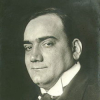Enrico Caruso

Enrico Caruso
Enrico Carusowas an Italian operatic tenor. He sang to great acclaim at the major opera houses of Europe and the Americas, appearing in a wide variety of roles from the Italian and French repertoires that ranged from the lyric to the dramatic. Caruso also made approximately 260 commercially released recordings from 1902 to 1920. All of these recordings, which span most of his stage career, remain available today on CDs and as downloads and digital streams...
NationalityItalian
ProfessionOpera Singer
Date of Birth25 February 1873
CityNaples, Italy
CountryItaly
To become a singer requires work, work, and again, work! It need not be in any special corner of the earth; there is no one spot that will do more for you than other places. It doesn't matter so much where you are if you have intelligence and a good ear.
The fact that I could secure an opera engagement made me realize I had within me the making of an artist, if I would really labor for such an end. When I became thoroughly convinced of this, I was transformed from an amateur into a professional in a single day.
It is too bad that the public expects from me, always, perfection which it is impossible for me always to attain. I am not a machine. I am a human being.
I never step upon a stage without asking myself whether I will succeed in finishing the opera. The fact is that a conscientious singer is never sure of himself or of anything. He is ever in the hands of Destiny.
I had always sung, as far back as I can remember, for the pure love of it. My voice was contralto, and I sang in a church in Naples from fourteen till I was eighteen.
I know that I am a singer and an actor, yet in order to give the public the impression that I am neither one nor the other, but the real man conceived by the author, I have to feel and to think as the man the author had in mind.
Now they're scrambling to buy their euros back.
During empathy one is simply 'there for' the other individual, when experiencing their own feelings while listening to the other, i.e. during sympathy, the listener pays attention to something about themselves, and is not 'there for' the client. Consider how you would feel if you sensed that the individual listening to you was getting into their own 'stuff' rather than hearing and reflecting exactly what you were feeling in a moment of need?
Jewish cantors employ a peculiar art and method of singing in their delivery. They are unexcelled in the art of covering the voice, picking up a new key, in the treatment of the ritual chant, and overcoming vocal difficulties that lie in the words rather than in the music.
It was he who impressed, time and again, the necessity of singing as nature intended, and - I remember - he constantly warned, don't let the public know that you work. So I went slowly. I never forced the voice.
I suffer so much in this life. That is what they [the audience] are feeling when I sing, that is why they cry. People who felt nothing in this life cannot sing.
Watermelon - it's a good fruit. You eat, you drink, you wash your face.
The U.S. may be keeping rates strong for the foreseeable future. It's a battle of yields and the dollar is still going to be king.
A big chest, a big mouth, 90 percent memory, 10 percent intelligence, lots of hard work, and something in the heart.